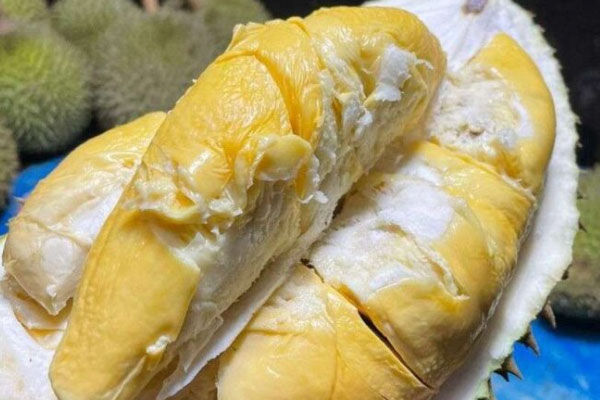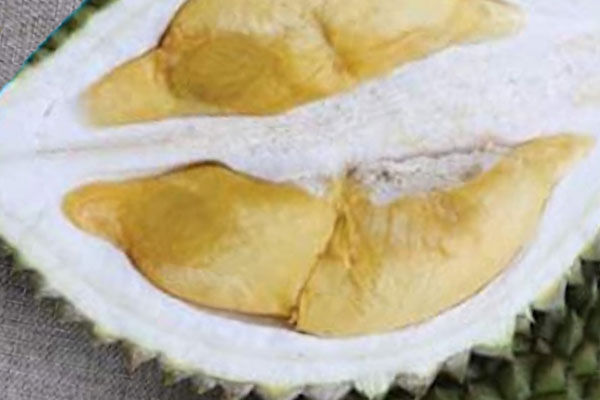
D118 Durian Tembaga
Sweet, a bit bitter Creamy, smooth Medium PopularityNamed for its distinctive deep yellow-orange or even coppery-colored flesh color, this variety offers a complex flavor profile that balances sweetness with sophisticated bitter notes.
Price Range
RM35 - RM50 per kg
Season
May - August
Taste
Sweet, a bit bitter
Aroma
Mild
Where to Find
While not a common variety in Penang, you can occasionally find them, particularly at stalls in George Town
Flavor Profile
Characteristics
Personal Comment for D118 Durian Tembaga
Inspect the Durian and Confirm Prices
Always begin by examining the displayed durians. If many appear subpar, be more caution and it's wise to look elsewhere.
Durian prices are highly variable, much like currency exchange rates. What you paid previously, even recently, might not apply today or tomorrow. Therefore, always confirm the price, even if a tag is visible, to avoid surprises after packing (e.g., being told the displayed price was for a different durian).
And given the highly personal nature of taste – everyone experiences flavors like sweetness and bitterness uniquely – it's best to trust your own palate by requesting a tasting from the seller.
Search Other Durian Varieties
Similar Varieties You Might Enjoy:

D5 Ibrahim
A stout durian with green-brown spikes. Its pale yellow flesh is prized for its dessert-like sweetness and mild aroma.
Learn More
D6 Samsu
The D6 Samsu is a classic, old-school durian with a very distinct and memorable profile. It's a love-it or hate-it fruit that stands in stark contrast to the more modern varieties.
Learn More
Tai Hung
Tai Hung is known for its balanced sweetness and mild bitter notes. The flesh is yellow with a thick consistency that many durian enthusiasts appreciate. It's considered a premium Kampung durian variety with good quality consistency.
Learn More
Let's talk about the D118 Durian Tembaga, shall we? It's like the quiet kid in class who actually has a super interesting backstory. We are talking about a specific type of durian, officially known as Durio zibethinus - basically, the most common durian out there.
The "Born in the 70s" Story
So, this D118 Durian Tembaga? It's not some random durian that popped up yesterday. It was actually officially registered way back in 1970 in a place called Kuala Kangsar, right here in Malaysia. Can you believe it? That's even before some of us were born! It's one of the registered durian varieties that Malaysia has registered since 1934. Talk about a durian dynasty! They actually used some pretty fancy techniques, like bud-grafting, to make sure this durian grew up with all the best qualities.
Why "Copper" Durian?
Now, about its name, "Tembaga". That's Malay for "copper," and it totally makes sense when you see it. Imagine opening up this durian and finding beautiful, deep yellow-orange or even coppery-colored flesh inside. It's quite a sight!
These durians are usually medium to large, kind of oval-shaped, and anywhere from 10 to 25 centimeters long. Their spiky exterior can be pale green, brown, or even golden, and those thorns are pretty distinctive with their five sides. Underneath those intimidating spikes, there's a thick, white, spongy layer protecting the precious fruit inside. The flesh itself is super smooth, almost slippery, and quite thick. And here's a little bonus: it usually has just a few small, flat seeds. More flesh for you!
The Taste That'll Get You Talking
Okay, here's where it gets interesting. The D118 Tembaga isn't just a pretty face; it's got a seriously complex flavor profile. We are talking sweet, a bit bitter, some pungent notes (it is durian, after all!), a touch of tannic, and even nutty. If you're a fan of bitter durians, this one might just become your new obsession. Many folks describe it as having this wonderful fine, fatty texture, with a strong bitterness that lingers. And if you're worried about that infamous durian smell, good news! Its aroma is generally considered milder compared to some of its more… aromatic cousins.
Finding This Elusive Gem
Want to get your hands on one? Well, you will usually find them between May and early August here in Malaysia. But here's the thing: even though it's got this amazing flavor, thick flesh, and small seeds, it's still pretty much a hidden gem globally. And honestly, it can be a bit of a treasure hunt to find it in local markets. But hey, if you are lucky, you just might stumble upon it!